SEB Meetings and Events
This article is an excerpt from a chapter of the "Celebrating 100 years of SEB" book.
The history of SEB meetings is a testament to the Society's evolution and commitment to fostering collaboration and knowledge exchange in the field of experimental biology. It all began with the inaugural conference held at Birkbeck College in December 1923, which set the pattern for subsequent meetings. In these early meetings, it was common to include papers on both plant and animal studies within the same session. However, as the Society continued to grow, the meetings expanded in size necessitating the introduction of parallel sessions. Botanical and zoological papers gradually separated into distinct sessions, and by the end of the 1930s, parallel sessions became a regular feature. The SEB Annual Conference is still organised as such, with parallel sessions on animal, plant, and cell biology topics, as well as outreach, education, and diversity sessions.
In 1926, the SEB expanded its event offering to hold three general meetings annually, traditionally concluding with the “Annual General Meeting” or “Annual Main Meeting” in London, either in December or January. In 1946, the Society introduced an annual symposium into its events calendar, resulting in a total of four meetings each year.
The introduction of symposia was a pivotal moment in the Society's history. These symposia, conceived after World War II, were inspired by a desire to promote research in experimental biology similar to that provided by the Cold Spring Harbor Symposia in the United States. The symposia, focusing on topics within experimental biology, became a hallmark of the SEB's annual events, drawing speakers and attendees from around the world. Today, SEB has expanded its symposium offerings, addressing topics including not just latest scientific research, but also outreach, education, and diversity themes. This reflects the SEB's commitment to advancing not only scientific knowledge but also the broader societal impact of experimental biology.
On 2nd December 2009, Council approved a new strategic plan for the Society, which involved significant developments in the SEB meetings. This plan led to the creation of the current streamlined event calendar, featuring a single "Annual Main Meeting" or "Annual Conference" usually scheduled during the first week of July. This international conference is complemented by two satellite meetings in the days preceding the main event, a strategic decision made to ease the travel-related challenges faced by an increasingly global membership. In the current era of hybrid and online meetings, SEB is exploring the possibility of reallocating funds to support alternative sponsorships and grants for our members, while also considering an expanded array of online events throughout the year in lieu of satellite meetings. Furthermore, it was decided that the conference should rotate through different European countries on each occasion, avoiding consecutive years in the UK to better serve the increasingly international membership.
The decision was also taken at this meeting to increase the number of symposia per year to two, providing researchers with a broader range of topics within the field of experimental biology. This change allowed for each scientific section to host a symposium every other year, as opposed to every three years, and introduced an education-themed symposium into the rotation, a theme further expanded in 2020 to include symposia focused on either education, outreach, or diversity topics. The symposium schedule was disrupted in 2020 and 2021 due to the unpredictable nature of the pandemic. Consequently, the 100th SEB symposium is expected to take place in 2030.
Across the past 100 years, the Society has occasionally collaborated with other organisations. Notable alliances include joint meetings with the British Association for the Advancement of Science in 1928, the Genetical Society in 1938 and 1942, and the British Ecological Society in 1977. Additionally, SEB held joint sessions with the Association of Applied Biologists in 1974, and the Association for the Study of Animal Behaviour, the British Society for Cell Biology, the Association of Applied Biologists, and the Phytochemical Society of Europe in 1978. Remarkably, the SEB meeting at the University of Edinburgh in 1978 marked the inception of the Federation of European Societies of Plant Physiology, underlining the Society's global reach and influence.
International meetings have played a pivotal role in the history of SEB meetings, fostering collaboration and knowledge exchange across borders. While the initial meetings primarily took place at universities and research institutions across the UK, 1947 marked a significant milestone with the Society's first international meeting taking place in Utrecht in the Netherlands.
SEB's tradition of international meetings remained strong. In 1950, members were asked to vote in a ballot to decide whether the next Annual Meeting should be held in the Netherlands, if meetings in countries other than the UK were favourable, and if anyone would be willing to contribute to a fund to help ease the financial burden on the Society. These proposals proved a very popular with members and in April 1951 SEB convened in Leiden, followed by gatherings in Groningen in 1955, Copenhagen in 1965, Wageningen in 1967, Gothenburg in 1971, and Nijmegen in 1974. From 2005, SEB meetings were rotated between various host cities across Europe, with the year also marking a shift to holding the Annual Meeting at dedicated conference centres instead of local universities. Looking ahead, perhaps the next century will witness SEB meetings reaching to further corners of the globe to engage with our international membership, which spans across nearly every continent.
First SEB Meeting
In December 1923, the inaugural conference of the Society for Experimental Biology (SEB) took place at Birkbeck College. Organised by the editorial board of the British Journal of Experimental Biology, this event brought together botanists, zoologists, and physiologists to share papers on a diverse array of experimental biology topics. The images below showcase the program book from that first meeting.
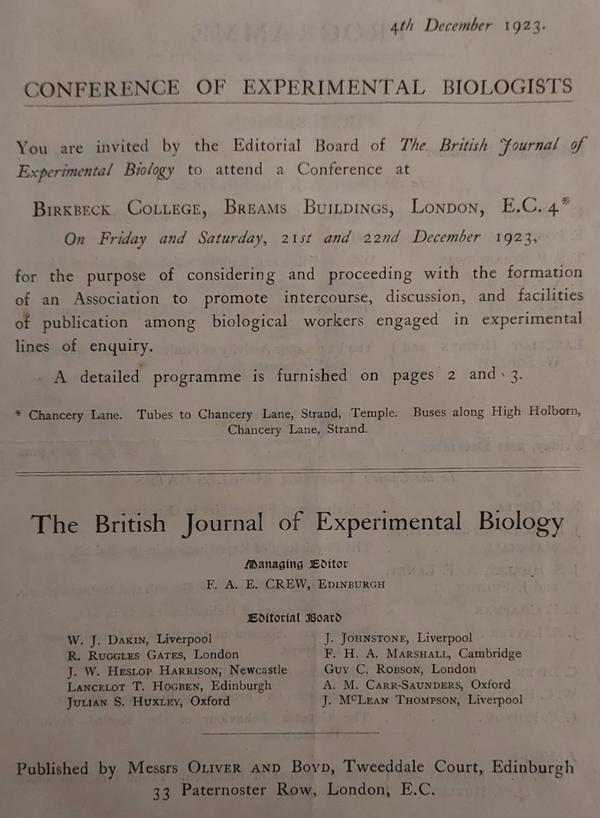
Programme book from the first SEB conference in 1923 (page 1).
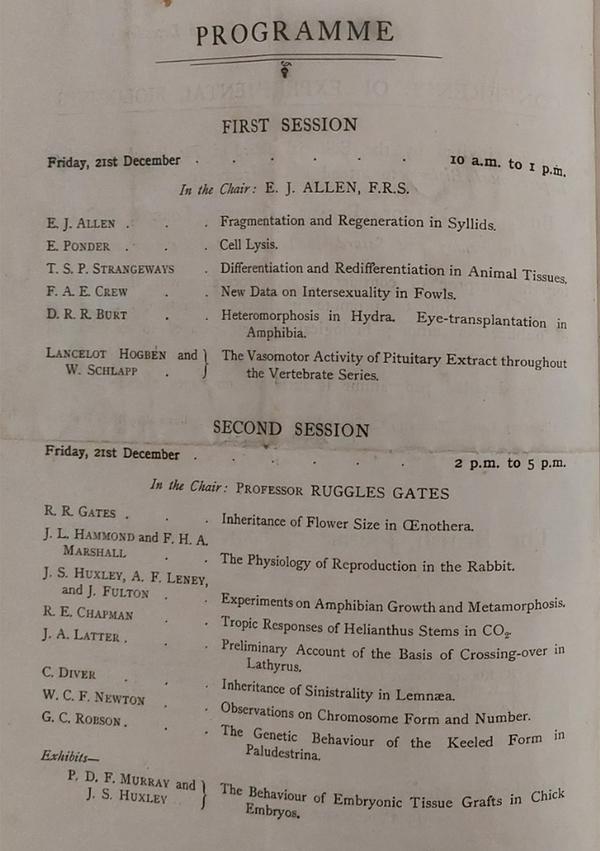
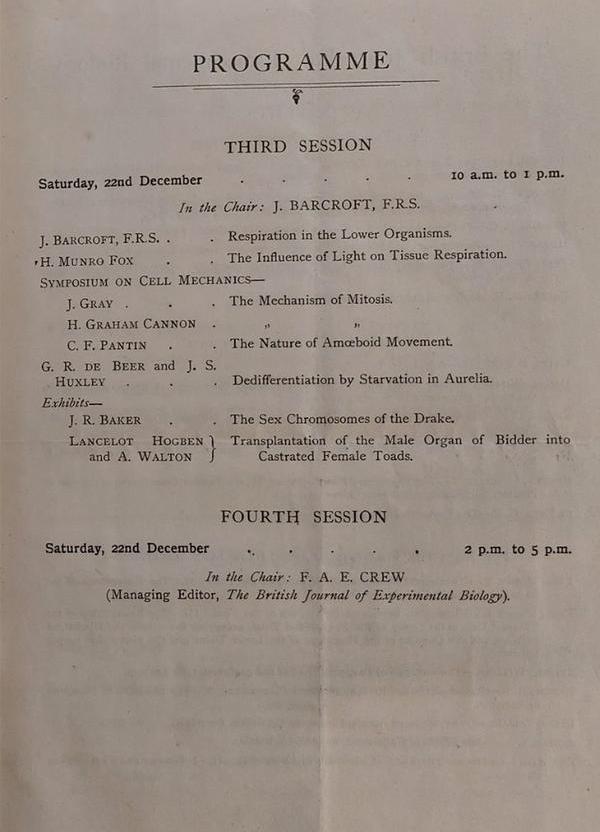
50th Anniversary Conference and Dinners
To celebrate the 50th anniversary of the Society, a special conference and two dinners were organised. One dinner was exclusively dedicated to the founders and honorary members, while a conference dinner was open to all attendees, providing an opportunity for a broader celebration. The proceedings of the 50th-anniversary meeting were held at the University of Cambridge, UK, from the 16th -19th July 1974, with the local organising team comprising Helen Skaer, D A Hunke, C G Gill, and D B Sattelle.
The papers submitted for the conference covered a wide range of topics, reflecting the diverse interests of the SEB. Prominent members of the Society were invited to present papers in their specialised fields, offering historical reviews, statements on current thoughts, and, when possible, predictive elements. Recognising the value of these contributions to the broader research community, speakers were encouraged to contribute their papers to two volumes, one focused on zoology and the other on botany.
The first volume, Zoology, encompassed topics such as osmotic and ionic regulation, invertebrate and insect physiology, respiratory physiology, and cell chemistry. In the second volume, Botany, a diverse collection of papers covered plant physiology, including cell cycling, leaf growth, flowering induction, and the role of hormones in plant morphogenesis. Additionally, topics extended to the growth and development of chloroplasts, etioplasts, and plastids, the biosynthesis of amino acids and proteins, and t transport processes.
The images below show the Menu’s from the two conference dinners that took place.
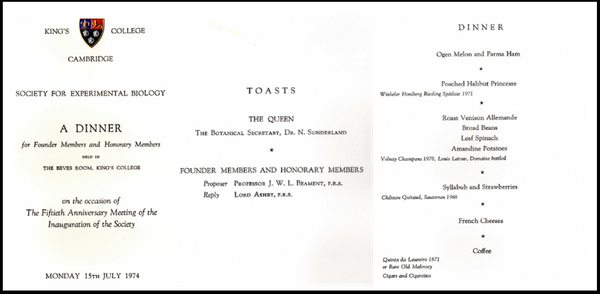
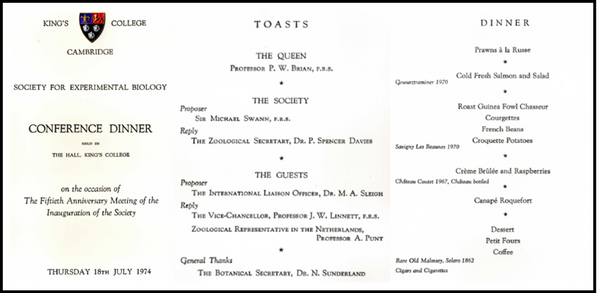
Centenary Meeting in Edinburgh
The Centenary Conference of the Society for Experimental Biology (SEB) in Edinburgh marked this significant milestone in the Society's history. The event brought together more than 1,000 delegates from various fields, making it the largest event in SEB’s history. The sessions covered the breadth of animal, plant, and cell biology and also featured numerous presentations and discussions on outreach initiatives, bioscience education, and improving diversity within the scientific community. The conferences thematic focus on sustainable development was encapsulated by the tagline "celebrating success and shaping the future." This forward-looking approach underscored the importance of science in addressing global challenges.
To mark the occasion, a number of celebratory activities beyond the regular program were planned. A public engagement event held in partnership with the Royal Botanic Garden Edinburgh (RBGE) the day before the conference allowed SEB members to share their research and enthusiasm for experimental biology with the general public and included interactive crafts and games for children and families. One of the unique offerings for conference delegates was an optional guided tour of Edinburgh's scientific landmarks, conducted by Invisible Cities, a social enterprise that empowers individuals who have experienced homelessness to become tour guides. This special tour delved into the city's scientific past, visiting locations like the graves of key scientific figures in the famous Greyfriars Kirkyard, Surgeons Hall, and Dynamic Earth where participants had the opportunity to touch a 2.8 billion-year-old rock.
The conference extended its impact through a joint evening event in collaboration with the Royal Society of Edinburgh. This special session delved into the past century of experimental biology, its future prospects, and the broader influence it holds in the world. Speakers engaged in thought-provoking discussions, shedding light on the advancements made in experimental biology research and its promising trajectory into the next century.
Notably, at the invite of outgoing President Jim Murray, the conference featured a keynote President's Centenary Lecture delivered by Sir Paul Nurse the Director of the Francis Crick Institute and a Nobel Prize laureate in Physiology or Medicine. This was followed by the conference dinner and awards ceremony at Dynamic Earth. The dinner was held under a giant slowly rotating globe, where Tracy Lawson, the incoming president, presented the awards for the President's Medallists, Plenary Lectures, Irene Manton Poster Prize, and Young Scientist Awards.
The conference's grand finale was the Diversity Lunch: a special occasion that celebrated diversity and inclusion in the scientific community. Dr. Shane Austin shared the work of the SEB Awards Nomination Task Force, which aims to recognize deserving members of the experimental biology community who may have been overlooked for awards. The lunch also featured a keynote speech by Professor Mark Blaxter, who leads the Tree of Life Programme at the Sanger Institute, offering insights into their aspiration to sequence all life on Earth. The lunch concluded with a Survivors Raffle, open to attendees who had participated throughout the entire conference. Prizes included free registration for next year's conference for an entire lab of up to 10 people, training packages, vouchers, and gifts from SEB sponsors and supporters.
Throughout the Centenary Conference and other celebratory events across the year, a special guestbook was provided, offering attendees the chance to contribute their memories, experiences, and well-wishes for the Society. This book will undergo digitalisation, and the physical copy will be preserved alongside SEB's archive documents, serving as a historical record of the year. The guestbook will also be available at the Centenary Dinner held at Bush House in King’s College London on the 23rd November 2023, an event dedicated to celebrating the contributions of individuals pivotal in shaping SEB's history over the past 100 years, including past presidents, SEB staff, trustees, partners, and some members.
The SEB's Centenary Conference was a remarkable and forward-looking celebration of science, diversity, and the future of experimental biology.
